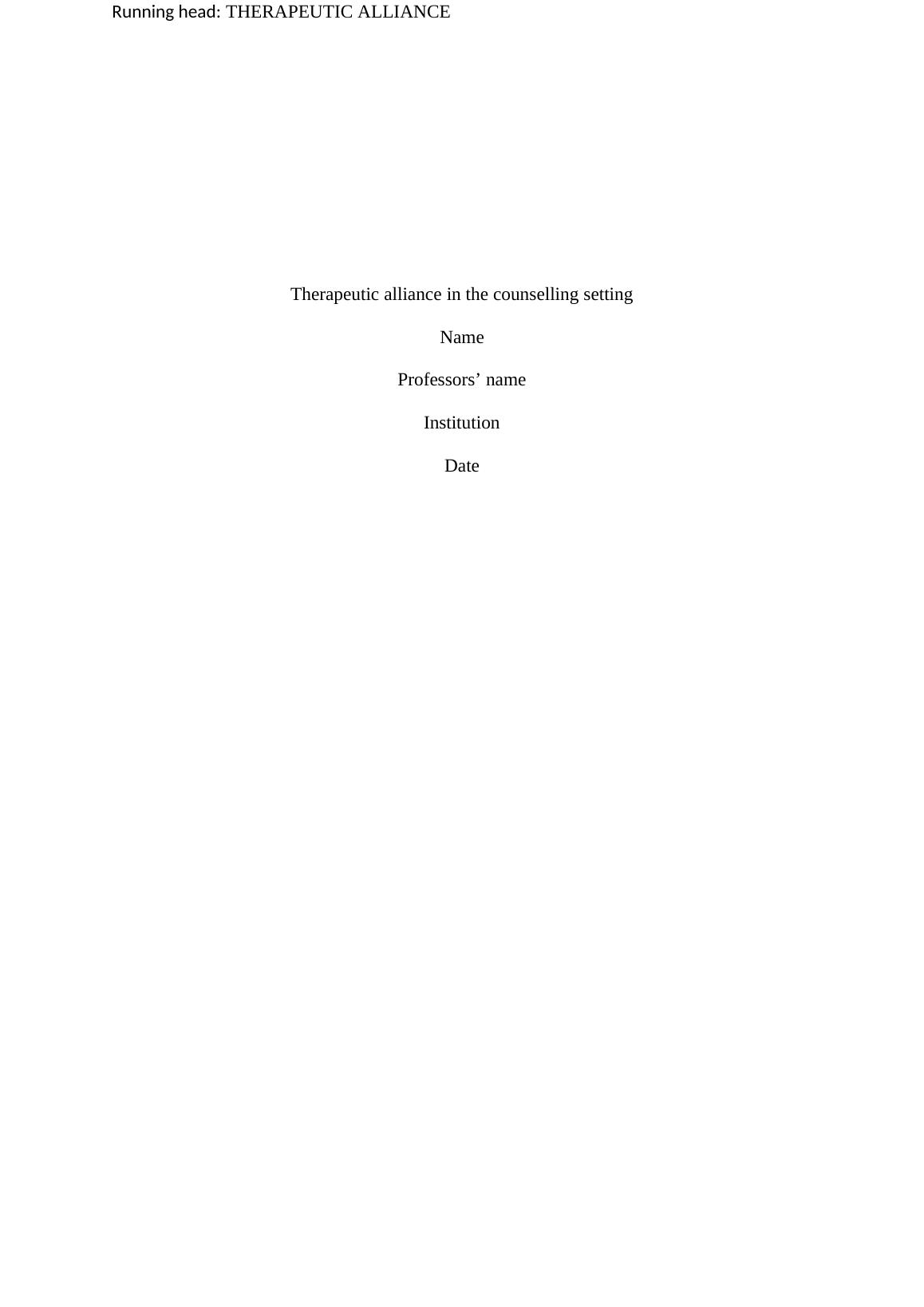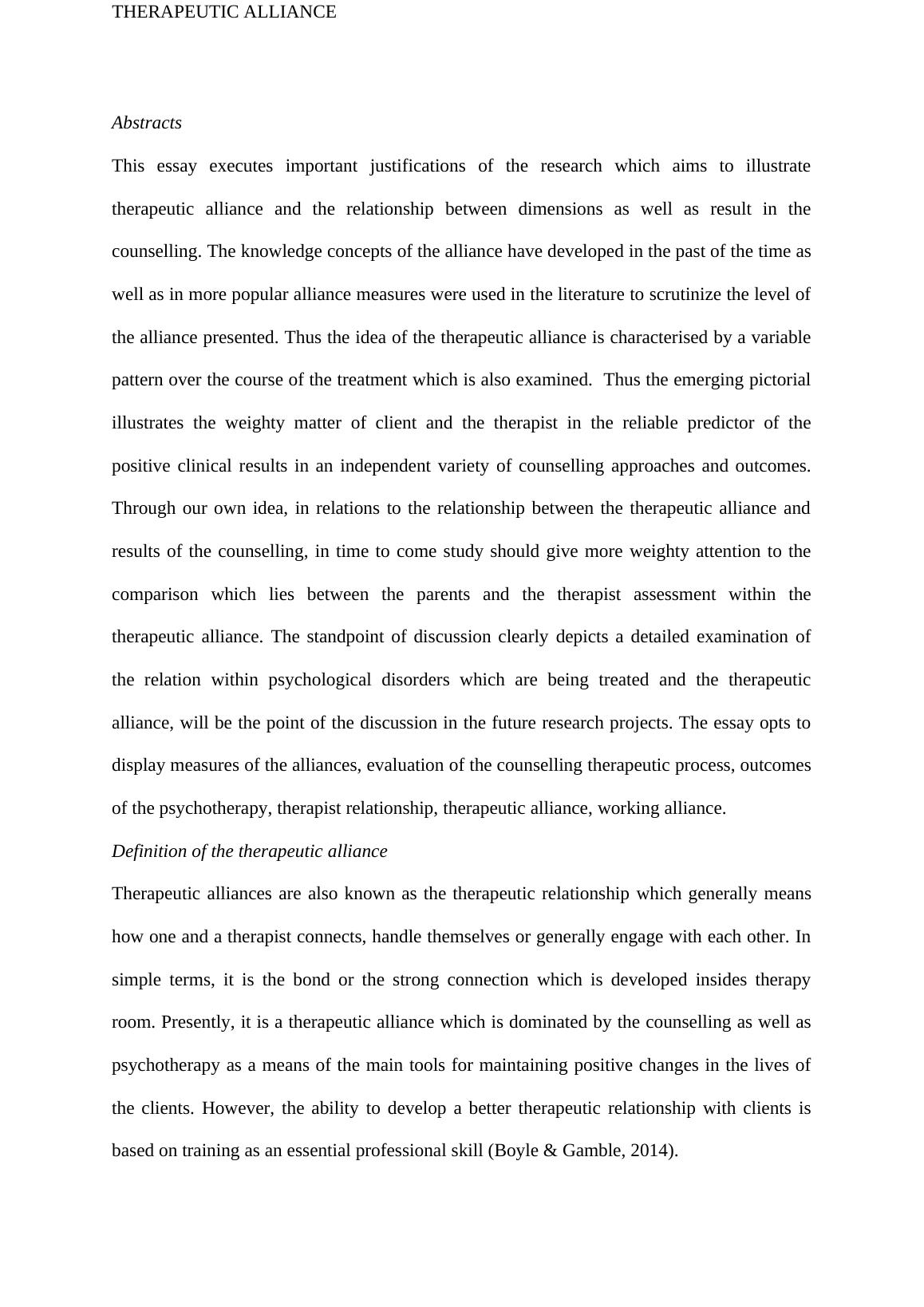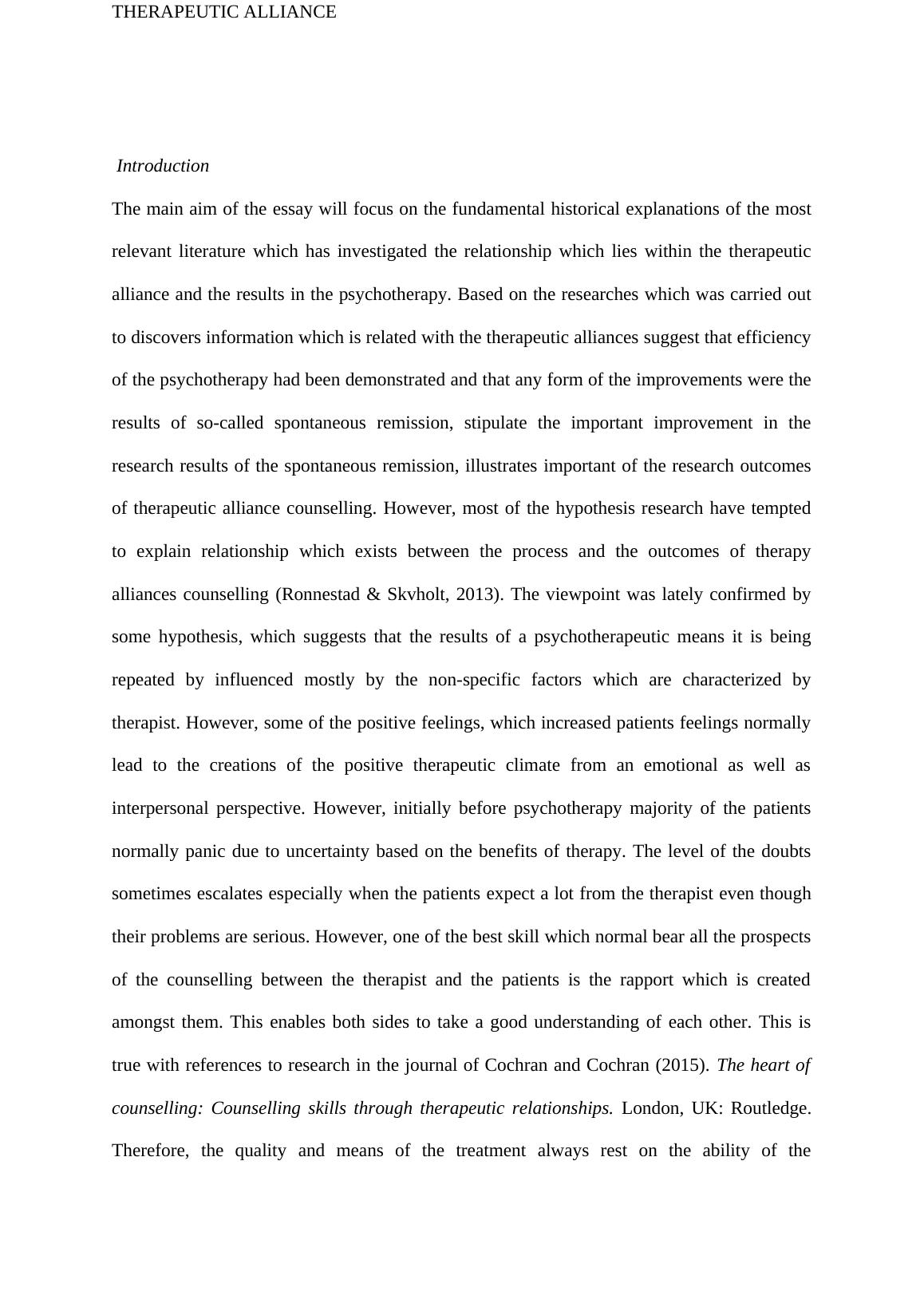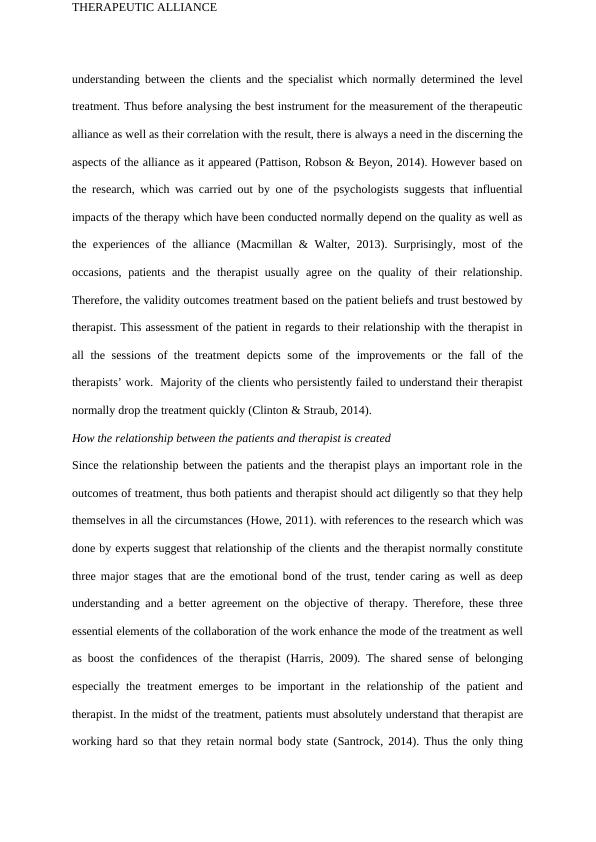Therapeutic Alliance in Counselling
11 Pages3378 Words81 Views
Added on 2023-03-17
About This Document
This essay explores the concept of therapeutic alliance in counselling and its impact on the outcomes of therapy. It discusses the importance of building a strong relationship between the therapist and the client, as well as the benefits and consequences of not being able to create a therapeutic alliance. The essay also highlights the role of communication and understanding in the therapeutic process.
Therapeutic Alliance in Counselling
Added on 2023-03-17
ShareRelated Documents
Running head: THERAPEUTIC ALLIANCE
Therapeutic alliance in the counselling setting
Name
Professors’ name
Institution
Date
Therapeutic alliance in the counselling setting
Name
Professors’ name
Institution
Date

THERAPEUTIC ALLIANCE
Abstracts
This essay executes important justifications of the research which aims to illustrate
therapeutic alliance and the relationship between dimensions as well as result in the
counselling. The knowledge concepts of the alliance have developed in the past of the time as
well as in more popular alliance measures were used in the literature to scrutinize the level of
the alliance presented. Thus the idea of the therapeutic alliance is characterised by a variable
pattern over the course of the treatment which is also examined. Thus the emerging pictorial
illustrates the weighty matter of client and the therapist in the reliable predictor of the
positive clinical results in an independent variety of counselling approaches and outcomes.
Through our own idea, in relations to the relationship between the therapeutic alliance and
results of the counselling, in time to come study should give more weighty attention to the
comparison which lies between the parents and the therapist assessment within the
therapeutic alliance. The standpoint of discussion clearly depicts a detailed examination of
the relation within psychological disorders which are being treated and the therapeutic
alliance, will be the point of the discussion in the future research projects. The essay opts to
display measures of the alliances, evaluation of the counselling therapeutic process, outcomes
of the psychotherapy, therapist relationship, therapeutic alliance, working alliance.
Definition of the therapeutic alliance
Therapeutic alliances are also known as the therapeutic relationship which generally means
how one and a therapist connects, handle themselves or generally engage with each other. In
simple terms, it is the bond or the strong connection which is developed insides therapy
room. Presently, it is a therapeutic alliance which is dominated by the counselling as well as
psychotherapy as a means of the main tools for maintaining positive changes in the lives of
the clients. However, the ability to develop a better therapeutic relationship with clients is
based on training as an essential professional skill (Boyle & Gamble, 2014).
Abstracts
This essay executes important justifications of the research which aims to illustrate
therapeutic alliance and the relationship between dimensions as well as result in the
counselling. The knowledge concepts of the alliance have developed in the past of the time as
well as in more popular alliance measures were used in the literature to scrutinize the level of
the alliance presented. Thus the idea of the therapeutic alliance is characterised by a variable
pattern over the course of the treatment which is also examined. Thus the emerging pictorial
illustrates the weighty matter of client and the therapist in the reliable predictor of the
positive clinical results in an independent variety of counselling approaches and outcomes.
Through our own idea, in relations to the relationship between the therapeutic alliance and
results of the counselling, in time to come study should give more weighty attention to the
comparison which lies between the parents and the therapist assessment within the
therapeutic alliance. The standpoint of discussion clearly depicts a detailed examination of
the relation within psychological disorders which are being treated and the therapeutic
alliance, will be the point of the discussion in the future research projects. The essay opts to
display measures of the alliances, evaluation of the counselling therapeutic process, outcomes
of the psychotherapy, therapist relationship, therapeutic alliance, working alliance.
Definition of the therapeutic alliance
Therapeutic alliances are also known as the therapeutic relationship which generally means
how one and a therapist connects, handle themselves or generally engage with each other. In
simple terms, it is the bond or the strong connection which is developed insides therapy
room. Presently, it is a therapeutic alliance which is dominated by the counselling as well as
psychotherapy as a means of the main tools for maintaining positive changes in the lives of
the clients. However, the ability to develop a better therapeutic relationship with clients is
based on training as an essential professional skill (Boyle & Gamble, 2014).

THERAPEUTIC ALLIANCE
Introduction
The main aim of the essay will focus on the fundamental historical explanations of the most
relevant literature which has investigated the relationship which lies within the therapeutic
alliance and the results in the psychotherapy. Based on the researches which was carried out
to discovers information which is related with the therapeutic alliances suggest that efficiency
of the psychotherapy had been demonstrated and that any form of the improvements were the
results of so-called spontaneous remission, stipulate the important improvement in the
research results of the spontaneous remission, illustrates important of the research outcomes
of therapeutic alliance counselling. However, most of the hypothesis research have tempted
to explain relationship which exists between the process and the outcomes of therapy
alliances counselling (Ronnestad & Skvholt, 2013). The viewpoint was lately confirmed by
some hypothesis, which suggests that the results of a psychotherapeutic means it is being
repeated by influenced mostly by the non-specific factors which are characterized by
therapist. However, some of the positive feelings, which increased patients feelings normally
lead to the creations of the positive therapeutic climate from an emotional as well as
interpersonal perspective. However, initially before psychotherapy majority of the patients
normally panic due to uncertainty based on the benefits of therapy. The level of the doubts
sometimes escalates especially when the patients expect a lot from the therapist even though
their problems are serious. However, one of the best skill which normal bear all the prospects
of the counselling between the therapist and the patients is the rapport which is created
amongst them. This enables both sides to take a good understanding of each other. This is
true with references to research in the journal of Cochran and Cochran (2015). The heart of
counselling: Counselling skills through therapeutic relationships. London, UK: Routledge.
Therefore, the quality and means of the treatment always rest on the ability of the
Introduction
The main aim of the essay will focus on the fundamental historical explanations of the most
relevant literature which has investigated the relationship which lies within the therapeutic
alliance and the results in the psychotherapy. Based on the researches which was carried out
to discovers information which is related with the therapeutic alliances suggest that efficiency
of the psychotherapy had been demonstrated and that any form of the improvements were the
results of so-called spontaneous remission, stipulate the important improvement in the
research results of the spontaneous remission, illustrates important of the research outcomes
of therapeutic alliance counselling. However, most of the hypothesis research have tempted
to explain relationship which exists between the process and the outcomes of therapy
alliances counselling (Ronnestad & Skvholt, 2013). The viewpoint was lately confirmed by
some hypothesis, which suggests that the results of a psychotherapeutic means it is being
repeated by influenced mostly by the non-specific factors which are characterized by
therapist. However, some of the positive feelings, which increased patients feelings normally
lead to the creations of the positive therapeutic climate from an emotional as well as
interpersonal perspective. However, initially before psychotherapy majority of the patients
normally panic due to uncertainty based on the benefits of therapy. The level of the doubts
sometimes escalates especially when the patients expect a lot from the therapist even though
their problems are serious. However, one of the best skill which normal bear all the prospects
of the counselling between the therapist and the patients is the rapport which is created
amongst them. This enables both sides to take a good understanding of each other. This is
true with references to research in the journal of Cochran and Cochran (2015). The heart of
counselling: Counselling skills through therapeutic relationships. London, UK: Routledge.
Therefore, the quality and means of the treatment always rest on the ability of the

THERAPEUTIC ALLIANCE
understanding between the clients and the specialist which normally determined the level
treatment. Thus before analysing the best instrument for the measurement of the therapeutic
alliance as well as their correlation with the result, there is always a need in the discerning the
aspects of the alliance as it appeared (Pattison, Robson & Beyon, 2014). However based on
the research, which was carried out by one of the psychologists suggests that influential
impacts of the therapy which have been conducted normally depend on the quality as well as
the experiences of the alliance (Macmillan & Walter, 2013). Surprisingly, most of the
occasions, patients and the therapist usually agree on the quality of their relationship.
Therefore, the validity outcomes treatment based on the patient beliefs and trust bestowed by
therapist. This assessment of the patient in regards to their relationship with the therapist in
all the sessions of the treatment depicts some of the improvements or the fall of the
therapists’ work. Majority of the clients who persistently failed to understand their therapist
normally drop the treatment quickly (Clinton & Straub, 2014).
How the relationship between the patients and therapist is created
Since the relationship between the patients and the therapist plays an important role in the
outcomes of treatment, thus both patients and therapist should act diligently so that they help
themselves in all the circumstances (Howe, 2011). with references to the research which was
done by experts suggest that relationship of the clients and the therapist normally constitute
three major stages that are the emotional bond of the trust, tender caring as well as deep
understanding and a better agreement on the objective of therapy. Therefore, these three
essential elements of the collaboration of the work enhance the mode of the treatment as well
as boost the confidences of the therapist (Harris, 2009). The shared sense of belonging
especially the treatment emerges to be important in the relationship of the patient and
therapist. In the midst of the treatment, patients must absolutely understand that therapist are
working hard so that they retain normal body state (Santrock, 2014). Thus the only thing
understanding between the clients and the specialist which normally determined the level
treatment. Thus before analysing the best instrument for the measurement of the therapeutic
alliance as well as their correlation with the result, there is always a need in the discerning the
aspects of the alliance as it appeared (Pattison, Robson & Beyon, 2014). However based on
the research, which was carried out by one of the psychologists suggests that influential
impacts of the therapy which have been conducted normally depend on the quality as well as
the experiences of the alliance (Macmillan & Walter, 2013). Surprisingly, most of the
occasions, patients and the therapist usually agree on the quality of their relationship.
Therefore, the validity outcomes treatment based on the patient beliefs and trust bestowed by
therapist. This assessment of the patient in regards to their relationship with the therapist in
all the sessions of the treatment depicts some of the improvements or the fall of the
therapists’ work. Majority of the clients who persistently failed to understand their therapist
normally drop the treatment quickly (Clinton & Straub, 2014).
How the relationship between the patients and therapist is created
Since the relationship between the patients and the therapist plays an important role in the
outcomes of treatment, thus both patients and therapist should act diligently so that they help
themselves in all the circumstances (Howe, 2011). with references to the research which was
done by experts suggest that relationship of the clients and the therapist normally constitute
three major stages that are the emotional bond of the trust, tender caring as well as deep
understanding and a better agreement on the objective of therapy. Therefore, these three
essential elements of the collaboration of the work enhance the mode of the treatment as well
as boost the confidences of the therapist (Harris, 2009). The shared sense of belonging
especially the treatment emerges to be important in the relationship of the patient and
therapist. In the midst of the treatment, patients must absolutely understand that therapist are
working hard so that they retain normal body state (Santrock, 2014). Thus the only thing

End of preview
Want to access all the pages? Upload your documents or become a member.
Related Documents
Ways Counsellor's Qualities and Counselling Relationship Contribute to Successful Outcomes in Therapylg...
|9
|2017
|86
A Systematic Review on the Efficacy of Functional Analytic Psychotherapy for the Treatment of Depressionlg...
|11
|1955
|27
Counselling Outcomeslg...
|10
|2843
|1
Importance of Therapeutic Relationship in Counsellinglg...
|8
|2556
|325
Rapport: A key to treatment successlg...
|4
|3045
|333
Effectiveness of Psychotherapies for Various Problemslg...
|6
|1087
|140
